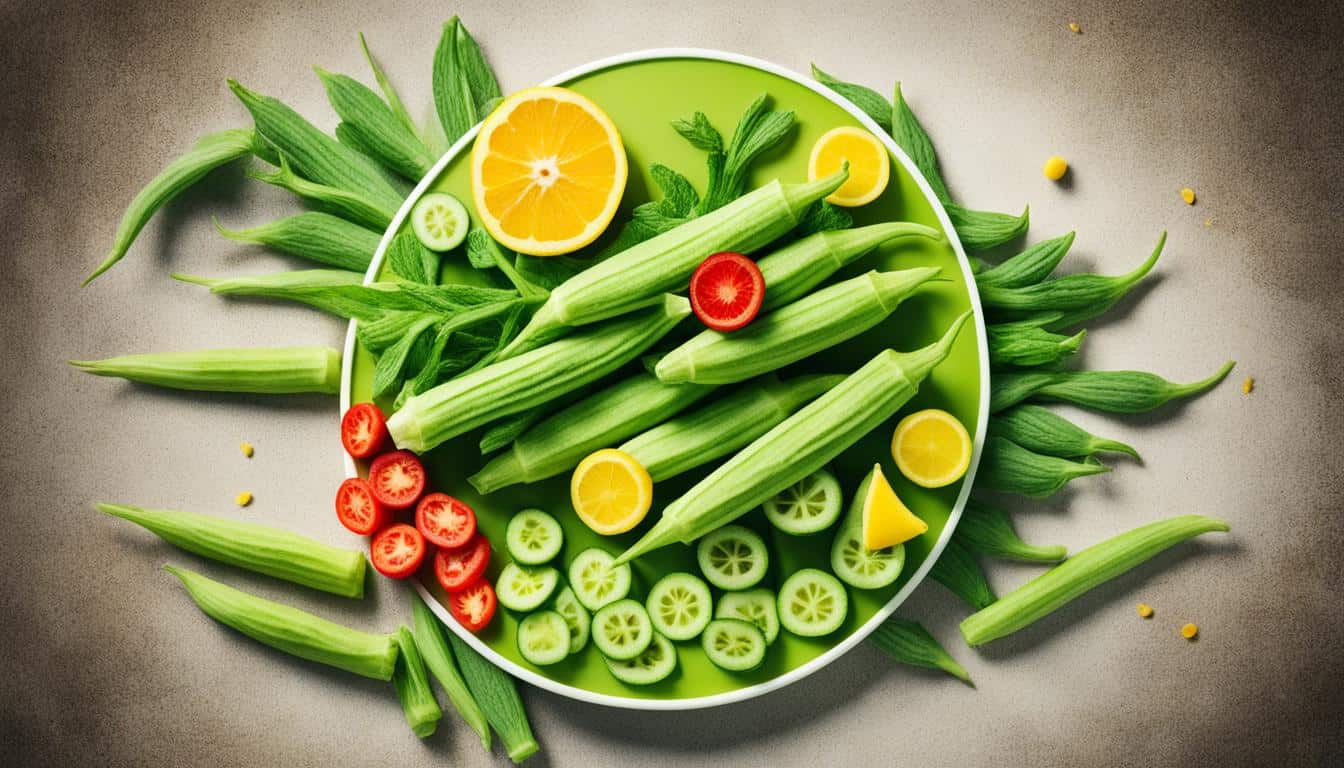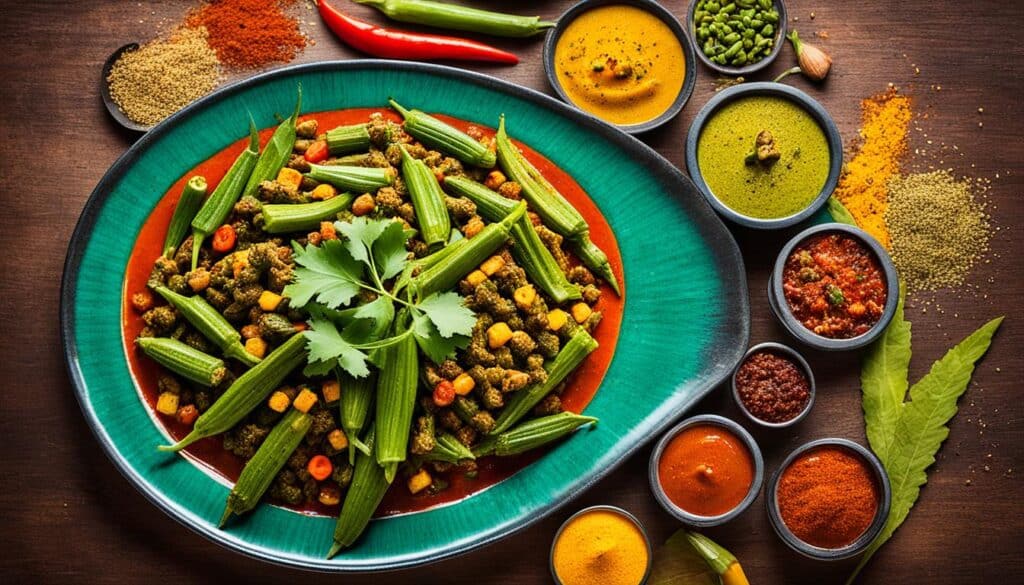Did you know that okra, also known as “lady’s finger,” is not just a popular vegetable but also a nutritional powerhouse? This humble vegetable is packed with essential nutrients and offers a host of health benefits. Whether you’re looking to improve your heart health, support brain function, or control blood sugar levels, okra might just be the answer you’re looking for.
Key Takeaways:
- Okra is a nutrient-dense vegetable that is low in calories but rich in vitamins, minerals, and antioxidants.
- It can support heart health, control blood sugar levels, and even help in fighting against cancer.
- There are various delicious recipes that you can try to incorporate okra into your diet.
- When selecting okra, look for firm pods, and store them properly to maintain their freshness.
- While okra offers numerous benefits, it’s important to be aware of potential precautions and risks, especially for individuals with specific health conditions.
What is Okra?
Okra, also known by names like “gumbo” and “lady’s finger,” is a warm-season vegetable that is technically a fruit. It belongs to the mallow family and is cultivated in warm climates, particularly in Africa and South Asia. The edible part of the okra plant is the seed pods, which are green or red in color. Okra has a mild taste and a unique texture, with a fuzzy exterior and small edible seeds inside the pod. It is versatile and can be used in a variety of dishes.
Okra is a popular vegetable in many cuisines and is widely used in dishes like soups, stews, stir-fries, and curries. It adds a distinct flavor and texture to recipes, making it a favorite among food enthusiasts.
Nutritional Content of Okra
Okra is not only delicious but also a nutritional powerhouse. It is packed with essential vitamins, minerals, and antioxidants that offer numerous health benefits. Incorporating okra into your diet can contribute to a well-rounded and nutritious eating plan.
Here is a breakdown of the nutritional content of okra:
| Nutrient | Amount per cup (cooked) |
|---|---|
| Vitamin K | 40.5 mcg |
| Vitamin C | 26.1 mg |
| Folate | 64 mcg |
| Magnesium | 57 mg |
| Calcium | 82 mg |
Along with these vitamins and minerals, okra is rich in antioxidants, particularly polyphenols. Antioxidants help combat oxidative stress in the body, reducing the risk of chronic diseases like cancer and inflammation.
Including okra in your meals can provide you with a wide range of nutrients that support overall health and well-being. Whether you sauté it, add it to soups and stews, or roast it in the oven, okra is a versatile vegetable that can elevate the nutritional value of your dishes.
Health Benefits of Okra
Okra is not only delicious but also offers a range of health benefits. Let’s explore how incorporating okra into your diet can contribute to your overall well-being.
Cancer Prevention
The antioxidants found in okra, such as polyphenols, can help protect against cancer. These powerful compounds have been shown to reduce the growth of cancer cells, preventing their progression and the development of tumors.
Heart Health
By including okra in your meals, you can support a healthy heart and reduce the risk of cardiovascular diseases. Okra has been found to lower cholesterol levels, especially the “bad” LDL cholesterol, which can lead to clogged arteries and heart problems. Additionally, the high fiber content in okra promotes a healthy digestive system and contributes to lower blood pressure levels.
Blood Sugar Control
For individuals looking to manage their blood sugar levels, okra can be a beneficial addition to the diet. The soluble fiber in okra helps slow down the digestion and absorption of sugar in the bloodstream, preventing sudden spikes in blood sugar. This is particularly important for people with diabetes or those at risk of developing the condition.
Healthy Digestion
The high fiber content in okra promotes regular bowel movements, prevents constipation, and supports a healthy digestive system. Fiber adds bulk to the stool, making it easier to pass through the intestines and preventing digestive issues. It also feeds beneficial gut bacteria, which contribute to overall gut health and support a strong immune system.
Health Benefits of Okra
| Health Benefit | Description |
|---|---|
| Cancer Prevention | Okra’s antioxidants help reduce the growth of cancer cells. |
| Heart Health | Okra lowers cholesterol levels and promotes healthy blood pressure. |
| Blood Sugar Control | Okra helps manage blood sugar levels and prevents spikes. |
| Healthy Digestion | Okra’s high fiber content promotes regular bowel movements and prevents constipation. |
Okra in Pregnancy
During pregnancy, it is crucial to maintain a healthy diet that supports both the mother and the growing fetus. Okra, with its abundance of nutrients, can be an excellent addition to a prenatal diet. One essential nutrient found in okra is folate, which plays a vital role in reducing the risk of neural tube defects in developing fetuses.
Neural tube defects are serious birth defects that affect the brain, spine, or spinal cord. Consuming foods rich in folate, like okra, can contribute to the healthy development of the baby’s brain and spine.
One cup of okra provides approximately 15% of the daily value of folate, making it an excellent source of this essential nutrient. Incorporating okra into your diet during pregnancy can help ensure that you are getting the folate your body needs to support the growth and development of your baby.
I highly recommend adding okra to your prenatal diet to benefit from its rich folate content. Alongside the other essential nutrients found in okra, it can help support the overall health of both you and your baby during this crucial time.
To showcase the folate content of okra, here’s a visual representation:
| Content | Amount per 1 cup (100g) |
|---|---|
| Folate | 15% DV |
It’s important to note that the dietary reference intake for folate during pregnancy is 600 mcg per day, and individual needs may vary. Be sure to consult with your healthcare provider to ensure that you are meeting your specific nutritional requirements.
I believe that consuming okra during pregnancy can provide valuable prenatal support. With its high folate content, okra contributes to the healthy development of the brain and spine in the growing fetus. Make sure to include this nutrient-packed vegetable in your prenatal diet for the overall well-being of both you and your baby!
Cooking with Okra
Okra can be prepared and cooked in various ways to suit individual preferences and culinary styles. To avoid the slimy texture often associated with okra, it is recommended to cook it at high heat in an uncrowded pan.
“To cook okra perfectly, make sure the pan is hot and not overcrowded. This helps the moisture evaporate quickly and prevents the slimy texture.” – Chef Emily Smith
Here are some cooking tips and recipe ideas to make the most of okra in your kitchen:
1. Oven Roasted Okra
Preheat your oven to 425°F (220°C). Toss trimmed and halved okra pods with olive oil, salt, and pepper. Spread them on a baking sheet in a single layer and roast for 20-25 minutes, until they are tender and crispy. Enjoy these roasted okra bites as a healthy snack or a side dish.
2. Tomato Okra Pasta
Cook your favorite pasta according to the package instructions. In a separate pan, sauté sliced okra with minced garlic in olive oil until they are lightly browned. Add a jar of tomato sauce and simmer for a few minutes. Serve the tomato okra sauce over the cooked pasta, and garnish it with grated Parmesan cheese and fresh basil.
3. Grilled Okra Skewers
Preheat your grill to medium-high heat. Skewer whole okra pods onto bamboo or metal skewers, and brush them with a mixture of olive oil, lemon juice, salt, and pepper. Grill the skewered okra for 3-4 minutes on each side, until they are charred and tender. Serve these grilled okra skewers as a tasty vegetable side dish.
4. Okra Stir-Fry
Heat a wok or a large skillet over high heat. Add sliced okra, along with your favorite stir-fry vegetables like bell peppers, snap peas, and carrots. Stir-fry them for a few minutes until they are tender-crisp. Season the stir-fried okra and vegetables with soy sauce, sesame oil, and a sprinkle of sesame seeds. Serve this vibrant okra stir-fry over steamed rice or noodles.
5. Quinoa Okra Pilaf
Cook quinoa according to the package instructions. In a separate pan, sauté diced onion and sliced okra in olive oil until they are slightly browned. Add cooked quinoa, vegetable broth, and seasonings like cumin, paprika, and dried herbs. Simmer the mixture until the flavors meld together, and the broth is absorbed. This quinoa okra pilaf can be enjoyed as a nutritious main dish or a delicious side.
| Recipe | Cooking Method | Preparation Time | Servings |
|---|---|---|---|
| Oven Roasted Okra | Roasting | 30 minutes | 2-4 |
| Tomato Okra Pasta | Sautéing, Simmering | 30 minutes | 4-6 |
| Grilled Okra Skewers | Grilling | 15 minutes | 2-3 |
| Okra Stir-Fry | Stir-Frying | 15 minutes | 2-4 |
| Quinoa Okra Pilaf | Sautéing, Simmering | 40 minutes | 4-6 |
Okra is also a popular ingredient in traditional dishes from different cuisines. For example, you can explore Southern cuisine by cooking a flavorful gumbo with okra, sausage, shrimp, and other savory ingredients. You can also add okra to your salads, soups, and stews to enhance both the taste and nutritional value.
Experiment with these cooking tips and recipes to unlock the true potential of okra in your meals. From crispy roasted okra to hearty okra pilaf, there are countless ways to enjoy this versatile vegetable and reap its health benefits.
Precautions and Risks
When it comes to consuming okra, it’s important to be aware of a few precautions and potential risks. While okra is generally considered safe for most people, there are certain factors to consider, especially if you have specific medical conditions or take certain medications.
1. Okra and Diabetes
If you have diabetes, it’s important to exercise caution when incorporating okra into your diet. Okra contains natural compounds that can potentially lower blood sugar levels. While this can be beneficial for some individuals with diabetes, it can also interact with certain diabetes medications, such as insulin or oral hypoglycemic drugs. Therefore, it is advisable to monitor your blood sugar levels closely and consult with your healthcare provider before adding okra to your diabetic meal plan.
2. Okra and Gastrointestinal Issues
Okra contains fructans, a type of carbohydrate that can be difficult to digest for some individuals. If you have existing bowel problems, such as irritable bowel syndrome (IBS) or a sensitivity to FODMAPs (fermentable oligosaccharides, disaccharides, monosaccharides, and polyols), consuming foods high in fructans like okra may cause gastrointestinal issues such as bloating, gas, and diarrhea. It is advisable to listen to your body and monitor how it reacts to okra consumption. If you experience discomfort, it may be best to limit or avoid okra in your diet.
3. Okra and Kidney Stones
Okra is relatively high in a compound called oxalates. In individuals susceptible to kidney stones, a diet high in oxalates can contribute to the formation of these stones. Therefore, if you have a history of kidney stones or are at risk for them, it’s recommended to moderate your intake of oxalate-rich foods, including okra. It’s always a good idea to consult with your healthcare provider or a registered dietitian for personalized advice and guidance.
4. Okra and Blood Thinners
For individuals taking blood-thinning medications, such as warfarin, it’s important to maintain a consistent intake of vitamin K to ensure proper blood clotting. Okra is a good source of vitamin K, which can potentially interfere with the effectiveness of blood thinners. It’s essential to work closely with your healthcare provider to find the right balance between your medication and vitamin K intake. They may recommend regular monitoring of your blood clotting factors and adjusting your medication if necessary.
Note: If you have any specific health concerns or are under medical supervision, it is best to consult with your healthcare provider or a registered dietitian before making any significant changes to your diet.
Okra in Different Cuisines
Okra is a versatile ingredient that plays a prominent role in various cuisines around the world. Its unique taste and texture make it a staple in many cultural dishes, adding flavor and character to each preparation.
In Indian cuisine, okra is a popular addition to curries, stir-fries, and pickles. Known as “bhindi” in Hindi, it is often cooked with an array of aromatic spices like cumin, turmeric, and coriander. These spices infuse the okra with rich flavors, creating a delightful and savory experience. Whether served alongside fragrant basmati rice or soft and fluffy flatbreads, okra brings a vibrant touch to Indian meals.
In African cuisine, okra is commonly featured in dishes like gumbo and jollof rice. It is highly valued for its thickening properties, which help create a luscious and hearty texture in stews and soups. The flavors of okra meld harmoniously with other ingredients, enhancing the overall taste of the dish. From the vibrant spices in West African cuisine to the aromatic flavors of North Africa, okra effortlessly contributes to the culinary diversity of the continent.
Whether it’s the fragrant spices of India or the rich flavors of Africa, okra weaves its way into the heart of cultural dishes, leaving a lasting impression on the taste buds of those fortunate enough to experience them.
So let’s take a moment to appreciate the versatility of okra as we explore some delightful dishes from these diverse cuisines.
How to Choose and Store Okra
When it comes to selecting the best okra for your culinary creations, there are a few tips to keep in mind. By choosing and storing okra carefully, you can ensure that it stays fresh, flavorful, and ready to be incorporated into your favorite recipes.
Choosing Okra
When selecting okra pods, look for ones that are taut and firm to the touch. Avoid pods that are shriveled, soft, or darkened, as these signs indicate that the okra may be past its prime. Fresh okra should have a vibrant green color and a smooth surface. By choosing high-quality okra, you’ll have the best foundation for a delicious dish.
Storing Okra
Proper storage is essential to maintain the freshness of okra. To keep your okra in optimal condition, store it in the crisper drawer of your refrigerator. Place the okra in a paper or plastic bag to prevent sliminess or mold. It is recommended to avoid washing okra until you are ready to use it, as excess moisture can accelerate spoilage.
When stored correctly, fresh okra can last for 3-4 days before it starts to lose its quality. Keep an eye on the okra and use it before it becomes too limp or discolored. By following these storage tips, you can maximize the shelf life of your okra and maintain its flavor, texture, and nutritional value.
Choosing and storing okra properly is essential to ensure that it remains fresh and delicious. By carefully selecting firm and vibrant pods and storing them in the refrigerator, you can enjoy the best quality okra for your recipes.
Okra Recipes to Try
Looking for some delicious ways to incorporate okra into your meals? Here are a few recipe ideas to try:
1. Okra Stir-Fry
Ingredients:
- 1 pound of fresh okra
- 1 tablespoon of vegetable oil
- 2 cloves of garlic, minced
- 1 tablespoon of soy sauce
- 1 teaspoon of sesame oil
- Salt and pepper to taste
Instructions:
- Wash the okra and cut off the stems. Slice the okra into thin rounds.
- Heat the vegetable oil in a skillet over medium heat. Add the minced garlic and sauté until fragrant.
- Add the sliced okra to the skillet and cook for about 5 minutes, or until tender but still crisp.
- Drizzle the soy sauce and sesame oil over the okra. Season with salt and pepper.
- Toss everything together and cook for an additional 1-2 minutes.
- Serve the okra stir-fry as a side dish or over rice or noodles.
2. Stuffed Okra
Ingredients:
- 1 pound of fresh okra
- 1 cup of cooked rice
- 1/2 cup of diced tomatoes
- 1/4 cup of diced onions
- 1/4 cup of chopped bell peppers
- 1/4 cup of grated Parmesan cheese
- 1/4 teaspoon of paprika
- Salt and pepper to taste
Instructions:
- Preheat the oven to 375°F (190°C).
- Wash the okra and cut off the stems. Make a slit lengthwise down the center of each okra pod.
- In a bowl, mix together the cooked rice, diced tomatoes, onions, bell peppers, Parmesan cheese, paprika, salt, and pepper.
- Stuff each okra pod with the rice filling, using a spoon or your fingers.
- Place the stuffed okra in a baking dish and bake for 20-25 minutes, or until the okra is tender and the filling is heated through.
- Remove from the oven and let cool for a few minutes before serving.
3. Okra Salad
Ingredients:
- 1 pound of fresh okra
- 1 cup of cherry tomatoes, halved
- 1/2 cup of sliced cucumbers
- 1/4 cup of sliced red onions
- 1/4 cup of chopped fresh parsley
- 2 tablespoons of olive oil
- 1 tablespoon of lemon juice
- Salt and pepper to taste
Instructions:
- Wash the okra and cut off the stems. Slice the okra into thin rounds.
- In a bowl, combine the sliced okra, cherry tomatoes, cucumbers, red onions, and parsley.
- In a separate small bowl, whisk together the olive oil, lemon juice, salt, and pepper to make the dressing.
- Pour the dressing over the okra salad and toss to coat everything evenly.
- Let the salad marinate in the refrigerator for at least 30 minutes before serving.
These recipes are just a starting point – feel free to get creative and adjust the ingredients to your taste. Enjoy the delicious flavors of okra in these easy and satisfying dishes!
Conclusion
In conclusion, okra is a fantastic vegetable that not only adds flavor and texture to your meals but also offers numerous health benefits. Packed with vitamins, minerals, fiber, and antioxidants, okra supports various aspects of your well-being.
One of the key health benefits of okra is its ability to promote heart health. Its rich antioxidant content helps lower cholesterol levels, reducing the risk of heart problems and stroke. Additionally, okra has been shown to help control blood sugar levels, making it beneficial for individuals with diabetes or those looking to maintain stable blood sugar levels.
Okra also plays a vital role in supporting a healthy digestive system. Its high fiber content aids in digestion and helps prevent constipation. Furthermore, okra is a great source of nutrients like vitamin K, folate, and magnesium, which are essential for maintaining strong bones and supporting overall bone health.
With its mild taste and unique texture, okra can be enjoyed in a multitude of ways. Whether you add it to soups, stews, stir-fries, or simply roast it for a healthy snack, you can easily incorporate okra into your regular diet. So why not give this versatile vegetable a try and start reaping the numerous health benefits it has to offer?










Leave a Reply